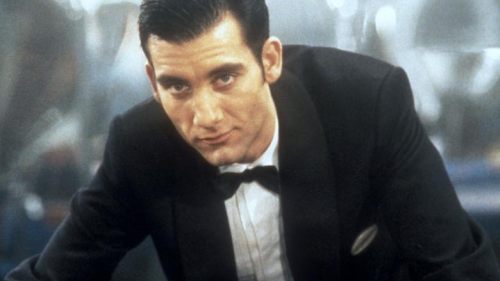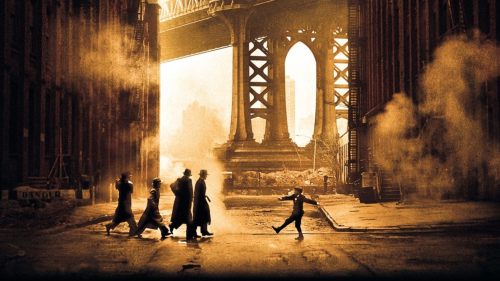A Case For Greatness: DEFENDING YOUR LIFE
Classics never die, but they seldom get replaced. Cinema is populated with enduring, venerated works of art that deservedly adorn list after list, but those lists are rarely updated, and less often expanded to include new, equally worthy entries. Organizations that give out annual awards are constrained not only by the limitations of formatting, but perspective - they can’t anticipate which film will survive the buzz of its initial acclaim or success and become part of the cultural firmament. And then there are just certain films or even genres that too infrequently receive the critical attention they deserve, are too obscure to break through to bigger audiences, or just aren’t taken seriously enough to merit consideration alongside the ones we “all” already know we love or respect. A Case For Greatness, this series, tries to argue for, and to champion, forgotten or underappreciated films in a variety of genres that may be worthy of being called “classics.”
As much as I enjoy and admire his work, if there’s one filmmaker I kind of worry about when I’m watching his movies, it’s Albert Brooks. There is a convincing argument to make that happy, successful, well-adjusted people are rarely funny on screen, but even so, Brooks seems to tap into a level of anxiety, self-doubt and neurosis so completely and convincingly that it makes me wonder if he’s ever any of those other things. From Taxi Driver to Finding Dory, he so often plays failures that I sometimes wonder if he even knows how big of a success he actually is, which is kind of why Defending Your Life, a movie about that very notion, is such a transcendent work of genius, even if I’m deathly afraid every time I watch it that Brooks’ character - appropriately written and directed by himself - won’t get the happy ending he deserves.
Brooks’ fourth film, Defending Your Life seems from the outset like a wild departure for the writer-director, a fantasy about the “afterlife,” complete with bottomless plates of delicious food, nights of deeply restful sleep and a soul mate as stunning, joyful and just plain good-hearted as Meryl Streep. But in Brooks’ hands, this sci-fi/ philosophical concept is a foundation for deep and unflattering reflection as individuals are, well, evaluated before moving on to whatever the next phase of their existence is going to be. Daniel Miller (Brooks) is an advertising executive - in 1991, a bad start - who dies in a car accident on his 39th birthday after purchasing a less nice car than he wants, for more money, and he’s whisked off to Judgment City for processing, and if determined worthy, sent on to the next step in his intellectual and emotional evolution.
Brooks creates a purgatory for Daniel that automatically fulfills his wildest fantasies and preys upon his deepest fears. Assigned an aloof “defense attorney” named Bob Diamond (a brilliant Rip Torn) to plead his case, Daniel worries that he’s not going to be sent to that next phase, especially after facing Diamond’s unforgiving adversary, Lena Foster (Lee Grant). He becomes further troubled when he learns that this process involves revisiting days from his life on earth that both sides of the case hope to use to illustrate his growth, improvement and maturity - or lack thereof. But so many of his former and current fears subside after meeting Julia (Streep), a woman who not only lived a seemingly perfect life, but whose ease and enjoyment of their circumstances make him fall head over heels in love.
What soon emerges is a portrait that is familiar to Brooks’ fans - a character waylaid by anxiety and insecurity - that becomes a mirror for audiences to examine their own shortcomings, patterns and choices. Brooks mines some of this for comedic gold - at one point Foster simply compiles a collection of pratfalls and goofs - but by creating a premise where each “case” involves looking at specific days in a person’s life where they grew, or didn’t, he allows viewers to speculate, and to wonder how their own lives might have been different had they stood up to a boss or splurged for an upgraded airline ticket even when they couldn’t afford it. Daniel’s behavior has been reinforced over and over again and the “case” and the film as a whole exists to shake him out of that routine - specifically, for him to stop fearing the success that he is chasing, and as a result, to stop preventing himself from achieving it.
Though Brooks has never been a particularly showy director, his conception of this afterlife holding area is chock full of details that seem alternately believable and hilariously inspired. (Creating a purgatory that is self-contained, featuring all conveniences and indulgences, and yet somehow operates with exasperating bureaucracy, allows Brooks the writer to both mine our humanity for some delightful wish-fulfillment and remind us of our inescapable limitations.) It doesn’t feel like a particularly spiritual film, but it probes philosophical ideas more profound - and spanning any number of religious beliefs - than movies that deliberately explore such topics. And ultimately, it’s the Brooks movie I find myself coming back to the most often, because it reminds us that in spite of everything we deal with, most of all ourselves, we need to try not to let ourselves be controlled by the things we fear - least of all, the mysterious “unknown” - and that we do deserve happiness, joy, and relief.
Brooks continues to explore this idea in so much of his work, primarily, and hysterically, reveling in our foibles, and its failure. This film unambiguously has a happy ending, but among almost all of the characters that he’s played, much less created for himself, this one feels like the most resonant, deserving and well-earned. Somehow, it feels even more like the mark of not just true inspiration but bona fide genius to stumble upon, expose and offer up so vividly one of the great truths humankind needs to learn, and to not even realize it - which is why this movie is not just funny or insightful, but genuinely resonant, and most of all, reassuring: even if I still worry about Albert Brooks, Defending Your Life uniquely makes me worry less about myself.



